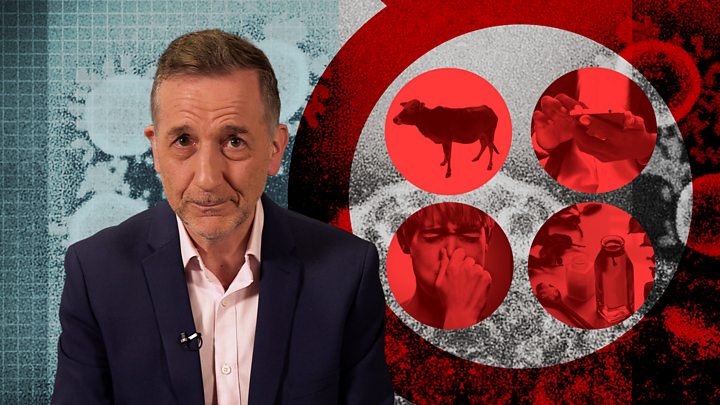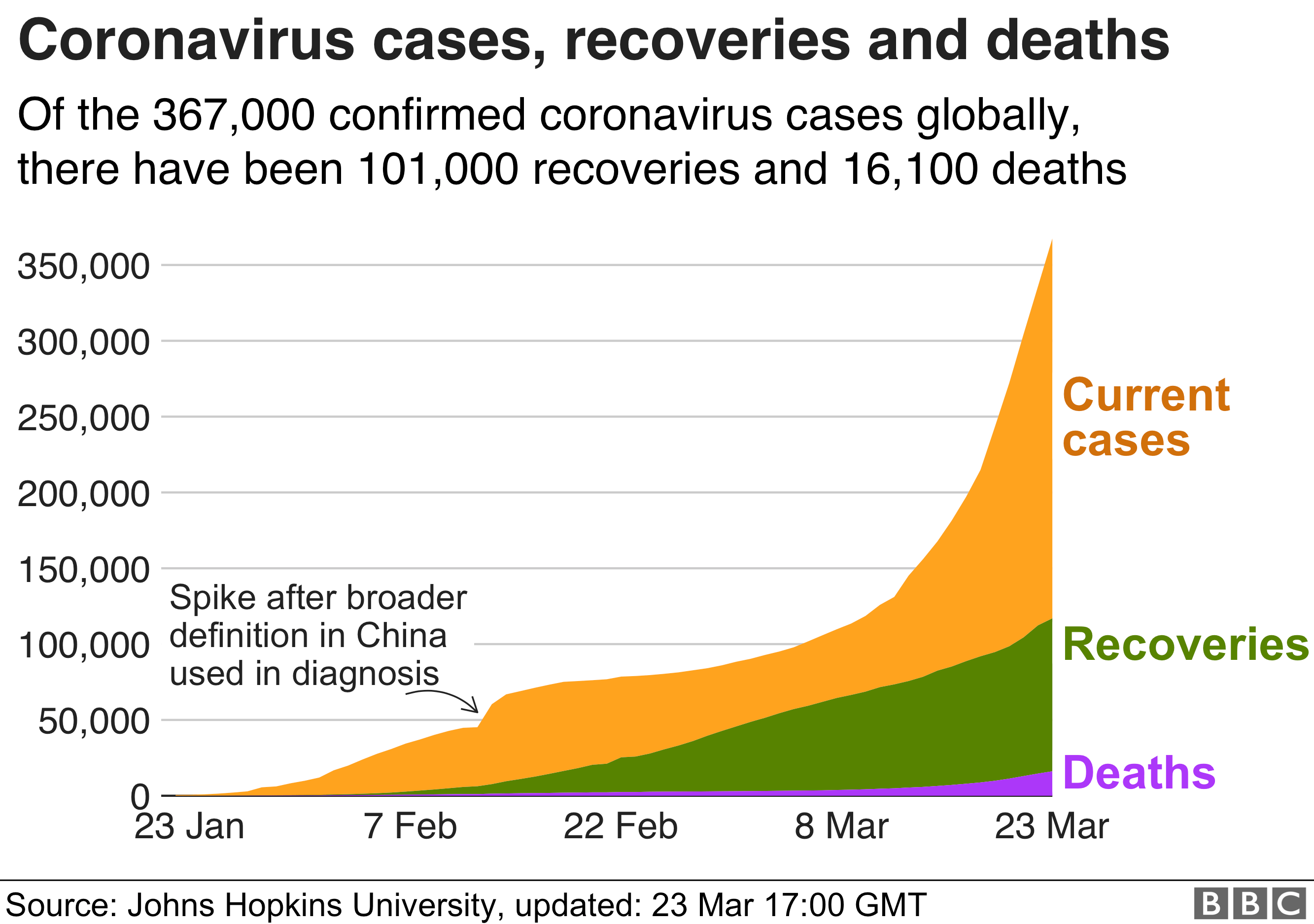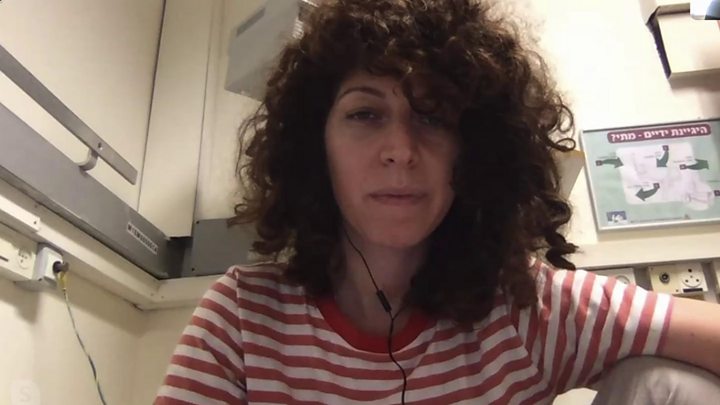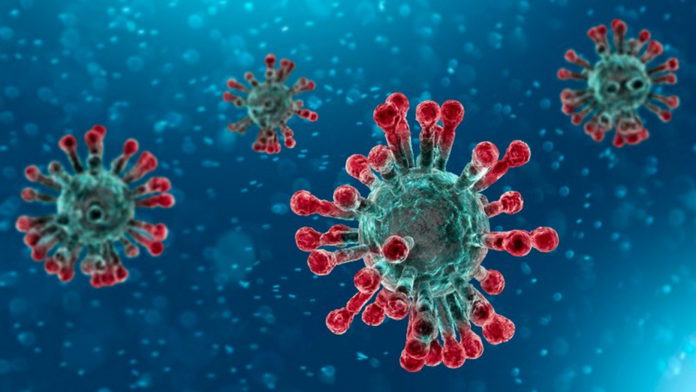The World Health Organization (WHO) has warned that the coronavirus disease pandemic is “accelerating”, with more than 300,000 cases now confirmed.
It took 67 days from the first reported of Covid-19 to reach 100,000 cases, 11 days for the second 100,000, and just four days for the third 100,000.
But WHO Director General Tedros Adhanom Ghebreyesus said it was still possible to “change the trajectory”.
He urged countries to adopt rigorous testing and contact-tracing strategies.
“What matters most is what we do. You can’t win a football game by defending. You have to attack as well,” he told a joint news conference with Fifa president Gianni Infantino to launch a “kick out coronavirus” campaign featuring footballers.
? Hands
— FIFA.com (@FIFAcom) March 23, 2020
? Elbow
? Face
↔️ Distance
? Feel
Let some of football's biggest names tell you what you need to be doing to help tackle #COVID19.
ℹ️Learn more ?https://t.co/iDwqhk1Nor@WHO | @GaryLineker | @Alissonbecker
@CarliLloyd | @teammessi | @setoo9 pic.twitter.com/cbW2o2hWuC
Dr Tedros said asking people to stay at home and other physical-distancing measures were an important way of slowing down the spread of the virus, but described them as “defensive measures that will not help us to win”.
“To win, we need to attack the virus with aggressive and targeted tactics – testing every suspected case, isolating and caring for every confirmed case, and chasing and quarantining every close contact.”
- A SIMPLE GUIDE: What are the symptoms?
- AVOIDING CONTACT: Should I self-isolate?
- STRESS: How to protect your mental health
- MAPS AND CHARTS: Visual guide to the outbreak
- VIDEO: The 20-second hand wash
Dr Tedros expressed alarm at reports from around the world of large numbers of infections among health workers, which appeared to be the result of a shortage of adequate personal protective equipment.
“Health workers can only do their jobs effectively when they can do their jobs safely,” he warned. “Even if we do everything else right, if we don’t prioritise protecting health workers many people will die because the health worker who could have saved their life is sick.”

He said the WHO has been working with its partners to rationalise and prioritise the use of protective equipment, and to address the global shortage of it.
But he noted: “Measures put in place to slow the spread of the virus may have unintended consequences of exacerbating shortages of essential protective gear and the materials needed to make them.”
The WHO chief called for “political commitment and political co-ordination at the global level” and said he would ask leaders of the G20 group of nations this week to work together to boost production of protective equipment, avoid export bans and ensure equity of distribution on the basis of need.

Europe’s battle against virus intensifies
UK Prime Minister Boris Johnson announced on Monday night that, with immediate effect, “people will only be allowed to leave their home…for very limited purposes”. They include shopping for basic necessities, taking one form of exercise per day, fulfilling any medical need, or travelling to work if working from home is impossible.
The number of people who have died in the UK rose to 335 on Monday.
In Italy, the worst-hit country in the world, the authorities said 602 people with Covid-19 had died in the past 24 hours, bringing the total death toll there to 6,077.
But the daily increase was the smallest since Thursday, raising hope that the stringent restrictions imposed by the government were starting to have an effect.
Spain, however, said its death toll had risen by 462 to 2,182 – a 27% increase.

France reported 186 new deaths, bringing its total to 860. The government will tighten the lockdown there from Tuesday, strictly limiting physical exercise and closing most open-air markets.
Meanwhile, International Olympic Committee member Dick Pound said the 2020 Tokyo Olympics would be postponed by one year because of coronavirus. However, the IOC has not yet formally announced a decision on the future of the Games.
The IOC has given itself four weeks to decide on the future of the games, but Australia and Canada have said they will not compete in Japan this summer and Great Britain has said it is unlikely that it would be able to send a team.

